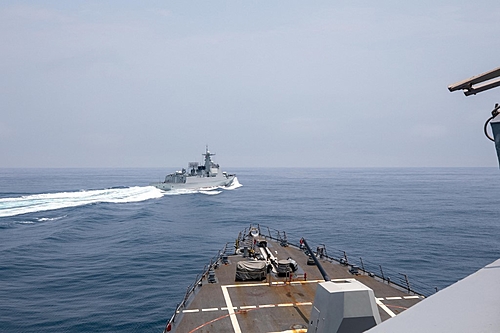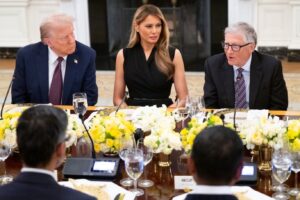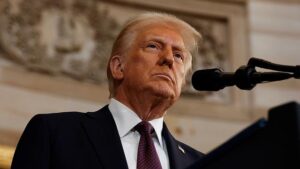
Military provocations near Taiwan continue and exchanges of barbs between China and the United States have increased in tone. But this does not mean that there is a risk of any kind of confrontation between the superpowers, nor of a Chinese invasion of Taiwanese territory. After all, such a posture would not suit a country that today plays an important role in mediating international conflicts.
“In the case of the Middle East, it is clear that the US is losing its role as a mediator and China is putting itself in its place”, says Bruno Hendler, professor of international relations at the Federal University of Santa Maria (UFSM), who did a sandwich doctorate at Renmin University in Beijing. He cites as an example the Chinese participation in security cooperation agreements in the Persian Gulf, involving countries of the Arabian Peninsula and Iran, something unthinkable until some time ago. “So, if China has this aspiration to place itself as a mediating and responsible power, it will not set up an operation to invade Taiwan. That is very clear to me.”
“I agree that orchestrating an invasion of Taiwan would be, in addition to being highly costly for Beijing, also a problem for its image on the global stage”, evaluates political scientist Luana Margarete Geiger, research coordinator at Observa China. According to her, it is important to consider that China officially supports peaceful resolutions to the Taiwan issue.
The war in Ukraine, says Geiger, has made the scene of armed conflict more tangible, raising spirits across the political spectrum. And there may even be the possibility of the use of force “if any of the red lines surrounding Taiwan’s declaration of independence are crossed.” However, she believes that “the already inflamed global conjuncture makes it less likely that the parties will consider adding yet another conflict which, in this case, would have global proportions and severely affect the global economy”. Also because the economic blockade imposed on Russia serves as a lesson for Beijing about the cost of direct involvement in a war against the developed western powers.
Speaking of the economic impact, last Saturday, US Secretary of Defense Lloyd Austin said that a war would be “devastating” and would affect the global economy “in ways we can’t even imagine”, as he emphasized his country’s support for Taiwan independence.
Bruno Hendler finds it necessary to change the focus when analyzing this issue. “There are people who say ‘Russia invaded Ukraine, so this is a precedent for China to invade Taiwan’. But the analogy we have to do is with the relationship between the US and Cuba.” For him, Washington used two weapons of classic imperialism with Havana: military force and economic strangulation. In a way, Russia does this to its neighbors too. But in the Chinese case, even though there is “this theater of military operations”, in the long term Taiwan will be incorporated into China “via economic attraction”, he believes. Taiwan would become a country with a hybrid system, with a certain degree of autonomy, but economically incorporated into Chinese territory. “China’s approach, rather than economic strangulation, is one of attraction.”
The UFSM professor thinks that this guideline would be put into practice through global value chains, brain drain and semiconductor technology, among other strategies. “Trials like this have already been seen. For example, the exemption of visas for the circulation of people, the authorization for self-employed professionals to work on both sides of the Taiwan Strait, a kind of free trade area in certain sectors”.
Taiwan represents, in Luana Geiger’s assessment, one of the most complex issues to resolve in contemporary international relations, as it functions as one of the main thermometers for the state of relations between the United States and China. “The population is used to regular crises in the Taiwan Strait. It is possible to observe, however, that since the visit of Nancy Pelosi — then Speaker of the US House of Representatives — to Taipei, in August 2022, when tensions reached unprecedented levels, precedents, a kind of new normal was inaugurated, raising the frequency and level of tensions”.
worst case scenario
Last week, China’s President Xi Jinping warned his National Security Commission to be ready for “the worst case scenario”. According to the political scientist, the Chinese leader’s speech demonstrates that the country is aware that strategic competition with the United States will mark the 21st century and, especially, that the country prioritizes its preparation for the scenario of growing antagonism. “China seeks to demonstrate a long-term vision and position of strength.”
Ukraine
Such a view keeps China out of the war in Ukraine, at least individually. “It is possible that Chinese diplomacy proposes or endorses pacification proposals that represent a multipolar world, that is, that distributes the mediation function with other countries. In this sense, I believe that the space for China to act as a mediator is greater if it presents itself as a collective proposal, which reflects an international order with multipolar characteristics and includes more actors”.
::Global South peace plans are relevant, but will only be taken seriously if China joins::
Neutrality
If the experts consulted by the Brazil in Fact If they are wrong and there is a conflict between China and the US, a majority of Europeans (62%) would prefer their countries to remain neutral, compared to 23% who would prefer to support the US. This is what a survey by the European Council on Foreign Relations shows, which shows that many European citizens (43%) see China as a necessary partner. The study surveyed 16,168 people in 11 countries (Austria, Bulgaria, Denmark, France, Germany, Hungary, Italy, Netherlands, Poland, Spain and Sweden) in April.
Editing: Thales Schmidt
Source: www.brasildefato.com.br

